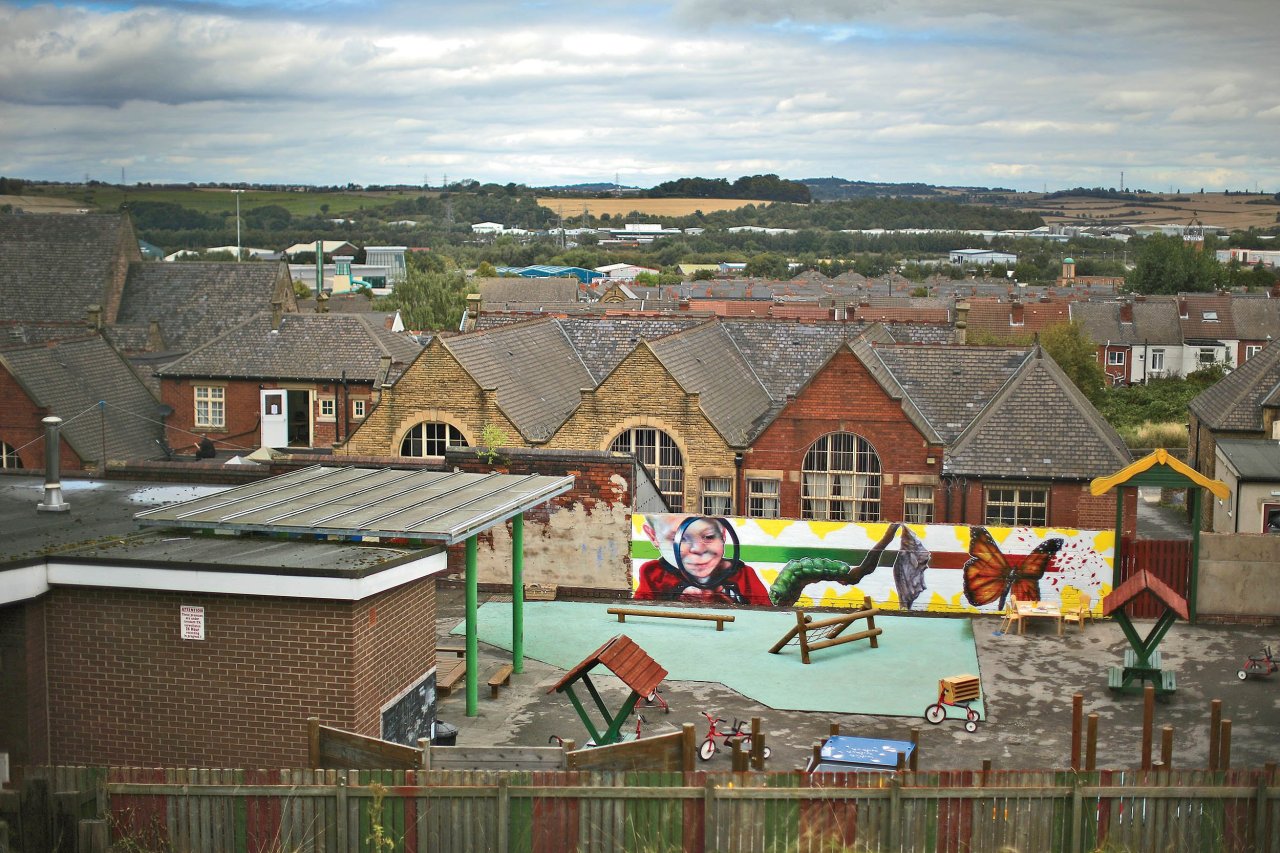
Many of the child sex abuse scandals that have shocked Britain in recent years involve victims who were supposed to be under the protection of the state—children identified as at risk by child protective services and in the care of local authorities.
Many in Britain have characterized the abuses as a thing of the past. Surely such horrors could never happen today. But an analysis of the most recent official data shows that each year the government loses track of around 2,000 vulnerable children in care, even as reports of human trafficking inside the country are on the rise.
Moved by a string of revelations of abuse involving entertainers, politicians and other public figures, Home Secretary Theresa May in February named New Zealand High Court Judge Lowell Goddard to chair a nationwide inquiry into decades of child sex abuse—much of it involving children in care.
At any given time, more than 30,000 children in England are in the care of local authorities, who monitor their progress and oversee their placement in government-run children's homes or with foster-care givers or other guardians. The authorities try to keep track of what happens to children who officially leave the care system, logging them in categories such as children who are adopted, returned to parents or family, taken into foster care, those who have grown out of care and those deceased. But children who don't fall into these categories—for instance, those who run away or end up homeless, abducted, trafficked or worse—are lumped into a category that the U.K. Department for Education simply labels "other," also known as "E8."
An analysis of the data shared with Newsweek shows that, according to Education Department statistics for the year ending March 31, 2013, around 1,910 children (legally defined as under the age of 18) left the care system in England for unknown "other" reasons, including 180 babies under the age of 1. In the same period in 2012, about 2,260 children left the system for "other" reasons, including 160 babies. Detailed figures for 2014 are not yet available.
According to Mike Murphy-Pyle, a spokesman for the Education Department, local authorities are given no guidance on how they should fill out the "other" category. "It is for everything else not covered by the other categories provided," he says. U.K. Education Minister Edward Timpson declined to comment.
While some of the children, particularly the older ones, may have left by choice, there is increasing concern about those under 16. There were 1,220 of them in the "other" category for the year ended March 31, 2013, and 1,420 for the same period in 2012.
"We have over 1,000 children a year who just go missing, and we don't know what's happening to them," says John Hemming, a Liberal Democrat in Parliament who provided the data to Newsweek. "You'd think with all the headlines over abuse of children in care, people would be all over this, but they're not. We are talking about children and babies. Why are we not doing a better job of tracking them?"
The Education Department releases limited data collected annually from local authorities across England, who must fill out what is called an "SSDA903 return," which asks for the details on children in care as well as those who leave care.
The refined figures of children missing for unknown "other" reasons provided by Hemming to Newsweek drilled further down into the data to reveal the ages and origins of the children who leave the system for unknown reasons. London showed the highest totals for children leaving care for unknown other reasons in the year ended March 31, 2013, with 370 under 18.
The statistics and reporting categories can be confusing, allowing for missing children to be easily conflated with runaways, says Hemming. "If local authorities wish to conceal a situation, they can simply put a child down as 'leaving care for other reasons,'" he says. "And no one will ever know what happened to the child."
Bad record-keeping has been a feature of the abuse scandals. Last autumn, a review by the U.K.'s National Society for the Prevention of Cruelty to Children found that between 1979 and 1999, the U.K. Home Office had "lost or destroyed" 114 files relating to reported child abuse by high-ranking people, including senior politicians. The review came after a report last year from Rotherham, South Yorkshire, revealed that at least 1,400 minors were subjected to widespread, organized child-sex abuse from 1997 to 2013, including many who were in care.

Hemming believes that better tracking of children who leave care might have made a difference in Rotherham and another abuse case, in Rochdale. In 2012, the same year abusers were brought to justice in Rochdale over a child sex ring that went ignored for years despite victims repeatedly seeking local authorities' help, the district did not provide any figures at all for children who left care for unknown reasons.
"[This] is all about abuse of power by employees of the state," says Hemming. "The fact that it involves the maltreatment of children for sexual gratification makes this all the worse. For the future, we need to make it harder for state employees to conceal abuses of power. More transparency and accountability are needed, as well as less secrecy."
Liz Davies, a veteran social worker who teaches at London Metropolitan University, says in light of the recent revelations of sexual exploitation and trafficking of vulnerable children in Rotherham, Rochdale, Oxford and other regions, there needs to be better reporting on children in care.
"Many children go missing from care but come back," she says. "No one is counting the ones that don't come back. There's no statutory requirement to report how many children have disappeared and have never been seen again. Really, we should have a report on every single one."
Hemming laments that the freshest data available are still nearly two years old. "The U.K. is clearly taking none of it very seriously," he says. "By the time the stats come in, it's nearly time to report them again." Hemming has data going back to 1995 showing more than 300 children a year under the age of 4 leaving England's care system for unknown reasons.
He says the lack of concern about vulnerable children is illustrated by the fact that statistics on children counted by local authorities are rounded to the nearest 10. "The system is that bad that we're losing hundreds of children due to rounding errors," Hemming says. "They don't care enough about the children to count them individually."
According to Murphy-Pyle, the rounding is a feature of "all government statistics" and also "protects the children's identity, in cases where only one child might fall into a given category." Hemming is not convinced by that argument. "It does not really make a difference in practice to confidentiality, and it makes checking the figures harder," he says.
Jon Bird, operations manager at London's National Association of Adults Abused in Childhood, says nearly half of the survivors who report to the group that they were victims of human trafficking were at one time inside the U.K.'s care system. "We hear from about 5,000 people a year and receive around one and a half thousand emails, and, increasingly over the past year, we've been hearing about this kind of abuse from children who've been in care," he says.
The U.K.'s Human Trafficking Centre's latest assessment shows a total of 2,744 people, including 602 children, reported as trafficked for exploitation in the U.K. in 2013, up 22 percent from 2012. The organization stresses that the numbers reflect only what's been reported and are rough figures. Not all reports indicate confirmed trafficking, but, at the same time, the totals could be much higher, as not all incidents are reported. Victims were forced to work in brothels, hotels, private homes or on the street as sex workers, and also forced into domestic servitude or to work on building sites or in farms and factories.
According to the latest statistics from the U.K.'s National Crime Agency, the number of trafficked children who were sexually exploited rose 250 percent in 2013 from the year before, representing 88 percent of all minors identified as victims of trafficking. The government-run National Crime Agency declined to discuss potential links between the child-care system and trafficking.
One of the reasons the numbers have spiked is that more people are coming forward, says Bird. "This has been going on for many decades, but it has always been ignored," he says. "In recent years, due to the headlines, there have been an increasing number of people reporting abuse in hopes they may finally be believed."
As far back as December 2011, Hemming asked then Education Minister Tim Loughton on the Parliament floor if he would consider overhauling the classifications tracking children in care, to make it easier to see what happened to children disappearing from the system and "to identify when a child runs away from care or is abducted or trafficked."
Loughton's response was similar to that of ministers before him. "The department has no plans to expand the codes under which local authorities provide statistical returns on children missing from care, as this will lead to an unnecessary increase in the reporting requirements."
In February, Hemming raised the issue in Parliament again, referencing the child sex ring in Rotherham. "Would it not be a good idea for the government to have an independent audit of what happens to these children and what is happening to the children who leave care officially for 'other' reasons?" he demanded of Eric Pickles, a conservative MP and secretary of state for communities and local government.
Pickles demurred from answering the question directly, saying, "I certainly feel that as a nation we need to do a lot more in terms of offering assistance to people who leave the care system."






